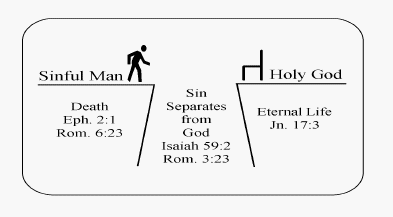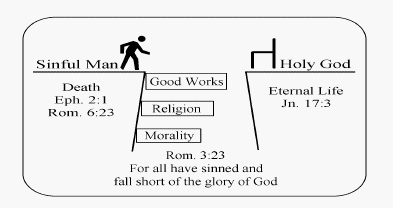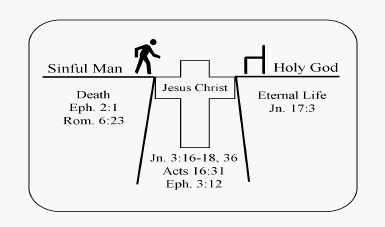Therefore IT WAS also CREDITED TO HIM AS RIGHTEOUSNESS.
23 Now not for his sake only was it written that it was credited to
him, 24 but for our sake also, to whom it will be credited, as
those who believe in Him who raised Jesus our Lord from the dead,
25 He who was delivered over because of our transgressions, and was
raised because of our justification.
What Does "Credited" Mean?
One more question before we leave chapter four of this great
letter to the Romans. It comes from verse 22: "Therefore, it
[faith] was credited to him [Abraham] as righteousness." So it says
that faith is counted as righteousness. We saw this in verse 3:
"Abraham believed God and it [his believing] was credited to him as
righteousness." And we saw it in verse 5b, "His [the one who
believes in him who justifies the ungodly] faith is credited as
righteousness." We saw it in verse 9b: "Faith was credited to
Abraham as righteousness."
Now what does this mean? Does it mean that faith itself is the
kind of righteousness we perform and God counts that as good enough
to be our righteousness - or our part of the righteousness - in
justification? Does he mean that justification, let's say, costs
five million dollars and I can come up with one million dollars
(namely, faith), so God mercifully says he will count my one
million as five million and cancel the rest? That would make my
faith the righteousness imputed to me - or a significant part of
it. So justification would be God's recognizing in me a
righteousness that he put there and that he acknowledges and counts
for what it really is. Is that what Paul means when he says, "faith
is credited as righteousness"?
Or is justification something very different - not God's seeing
any righteousness in me, but his crediting to me his own
righteousness in Christ through faith? And if so, what does it mean
to say that faith is credited as righteousness?
And Why Does It Matter?
Before I answer, let me tell you why I am giving an entire
sermon to this question before we launch into chapter five, Lord
willing, next week.
First, it's because the phrase is so liable to misunderstanding:
"Faith is credited as righteousness" sounds like faith is
recognized to be righteousness. But I am persuaded that is not what
it means.
Second, because Paul spends so much time on this phrase from
Genesis 15:6 -a whole chapter. As if, to get this wrong would be to
go wrong on something very important. And that is true. Is your
legal standing with God as righteous based on what he is or what
you are? You may not see why this is very big, but it is big. On
this hangs the fullness of the glory of God's grace in your
justification, and on this hangs the fullness of the enjoyment of
your peace in justification. And not only yours but all those you
should bless with the gospel. So God's glory and your peace are at
stake in this question.
"Imputation" - an Important Word to Understand
Third, because
Ephesians 4:14 says the goal of my preaching
ministry should be that you "are no longer to be children, tossed
here and there by waves and carried about by every wind of
doctrine." I want you to be strong and stable and mature. In
particular, I want you to know the doctrine of the imputation of
God's righteousness in Christ. I know "imputation" is a big and
unusual word. But this is the word that has been used for hundreds
of years to describe the truth that God "imputes" his righteousness
to us through faith because of Christ's obedience. Why should you
be denied what tens of thousands of strong Christians have been
strengthened by for centuries - the "imputation" of God's
righteousness in Christ? It's a glorious truth that will change
your life if you see it and savor it for what it is.
"Imputation" is different from "impartation." God does "impart"
to us gifts and fruits of the Holy Spirit, so that we have them and
they are in us growing and they are ours. But all of that gracious
impartation through the Spirit is built on an even more firm
foundation, namely, imputation - the work of God outside of us:
God's own righteousness, not imparted to us, but imputed to us.
Credited to us, as
Romans 4:6 and
11 say. Put to our account.
Reckoned to be ours. I ask myself as a pastor, Why should the
people of Bethlehem be denied the knowledge of this great doctrine
that has sustained saints for centuries? Why should we cave in to
the modern pragmatism that says doctrine is impractical? And I
answer: we shouldn't.
Fourth, the experience of God's people through the centuries has
shown what a treasure this truth is in bringing people from the
darkness of unbelief to the light of hope and joy in Christ. One
example is John Bunyan, the writer of Pilgrim's Progress, who
struggled terribly before he came to a settled faith in Christ.
Here's what he wrote:
One day as I was passing into the field . . . this sentence fell
upon my soul. Thy righteousness is in heaven. And methought,
withal, I saw with the eyes of my soul Jesus Christ at God's right
hand; there, I say, was my righteousness; so that wherever I was,
or whatever I was doing, God could not say of me, he wants [lacks]
my righteousness, for that was just before [in front of] him. I
also saw, moreover, that it was not my good frame of heart that
made my righteousness better, nor yet my bad frame that made my
righteousness worse, for my righteousness was Jesus Christ himself,
"The same yesterday, today and, and forever" (
Hebrews 13:8).
Now did my chains fall off my legs indeed. I was loosed from my
afflictions and irons; my temptations also fled away; so that from
that time those dreadful scriptures of God left off to trouble me;
now went I also home rejoicing for the grace and love of God. (John
Bunyan, Grace Abounding to the Chief of Sinners, [Hertfordshire:
Evangelical Press, 1978, orig. 1666], pp. 90-91)
Perhaps the most pointed way I could put it would be this: I
linger over this issue of the imputed righteousness of God in
Christ because when I stand by your bed in the hour of your death,
I want to be able to look down into your face and remind you of the
most comforting words in all the world, and have you rejoice with
solid Biblical understanding in what I mean when I say: "Remember,
Christ is your righteousness. Christ is your righteousness. Your
righteousness is in heaven. It's the same yesterday today and
forever. It doesn't get better when your faith is strong. It
doesn't get worse when your faith is weak. It is perfect. It is
Christ. Look away from yourself. Rest in him. Lean on him."
And not only do I want you to cherish this for the sake of your
death, but also for the sake of your evangelism and for the sake of
missions. The gospel is the power of God unto salvation, Paul says
in
Romans 1:16-17, because in it the righteousness of God is
revealed from faith to faith. I believe this refers to the gift of
God's imputed righteousness that we receive by faith. Paul says
that the gospel has power because this is what it reveals. This is
what I want the Maninka people of Guinea to hear and understand and
believe. And the Uzbeks and the Kazaks and the Sukumu and the
Somali and your children and your parents and neighbors and
colleagues.
Does Paul Mean "Our Faith Is Our Righteousness?
So here is my answer to the question. No, when Paul says "Faith
is credited to us as righteousness," he does not mean that our
faith is our righteousness, or any part of our justifying
righteousness. He means that faith is what unites us with Christ
and all that God is for us in him. When God sees faith in Christ,
he sees union with Christ. And when he sees union with Christ, he
sees the righteousness of Christ as our righteousness. So faith
connects us with Christ who is our righteousness and, in that
sense, faith is counted as righteousness. Faith sees and savors all
that God is for us in Christ, especially his righteousness. That's
what faith does.
Now what is the Biblical basis of that interpretation? John
Owen, in volume five of his Works (pp. 318-319) gives five
arguments, and John Murray in his commentary on Romans gives nine
arguments (pp. 353-359) why "faith credited as righteousness" does
not mean that faith is our righteousness. I will give a few of
these.
First, notice that at the end of verse 6 and at the end of verse
11 in Romans 4 you have a very different way of expressing
"imputation" or crediting. At the end of verse 6 it says, "God
credits righteousness apart from works." And at the end of verse 11
it says, ". . . that righteousness might be credited to them."
Notice: in both of these, faith is not the thing credited as
righteousness, but righteousness is the thing credited to us. "God
credits righteousness," not "God credits faith as righteousness."
What this does is alert us to the good possibility that when Paul
says, "Faith is credited as righteousness," he may well mean, "God
credits righteousness to us through faith."
Second, look at
Romans 3:21-22, "But now apart from the Law the
righteousness of God has been manifested, being witnessed by the
Law and the Prophets, even the righteousness of God through faith
in Jesus Christ for all those who believe." Notice that it is God's
righteousness that comes to us through faith. Faith is what unites
us to God's righteousness. Faith is not God's righteousness.
Third,
2 Corinthians 5:21, "He [God] made Him who knew no sin to
be sin
on our behalf, so that we might become the righteousness of
God in Him." Here we have a double imputation. God imputed our sins
to Christ who knew no sin. And God imputed his righteousness to us
who had no righteousness of our own. The key phrases for us are
"the righteousness of God" and "in Him." It's not our righteousness
that we get here. It is God's righteousness. And we get it not
because our faith is righteous, but because we are "in Christ."
Faith unites us to Christ. And in Christ we have an alien
righteousness. It is God's righteousness in Christ. Or you can say
it is Christ's righteousness. He takes our sin. We take his
righteousness.
Fourth, consider
1 Corinthians 1:30. John Bunyan said that,
after that experience in the field where the imputed righteousness
of Christ hit him so powerfully, he went home and looked for
Biblical support. He hit upon
1 Corinthians 1:30. "But by His
[God's] doing you are in Christ Jesus, who became to us wisdom from
God, and righteousness and sanctification, and redemption." "By
this scripture," Bunyan said, "I saw that the man Christ Jesus . .
. is our righteousness and sanctification before God. Here
therefore I lived for some time very sweetly at peace with God,
through Christ" (Grace Abounding, p. 91).
Christ Is Our Righteousness
This text says that Christ became to us (or for us)
"righteousness." And the reason Christ is our "righteousness" in
this way is that we are "in Christ Jesus." "You are in Christ Jesus
who became to us . . . righteousness." Christ is our righteousness,
not faith. Faith unites us to Christ and all that God is for us in
him. But what he is for us in him is righteousness.
So then what is the point of all this? The point is this: When
Paul says in
Romans 4:22 (and verses 3, 5, and 9) that "faith is
credited as righteousness," he does not mean that our faith is our
righteousness. He means that our faith unites us to Christ so that
God's righteousness in Christ is credited to us.
Here's a very imperfect analogy. But I will risk it in the hope
of greater understanding. Suppose I say to Barnabas, my
sixteen-year-old son, "Clean up your room before you go to school.
You must have a clean room, or you won't be able to go watch the
game tonight." Well, suppose he plans poorly and leaves for school
without cleaning the room. And suppose I discover the messy room
and clean it. His afternoon fills up and he gets home just before
it's time to leave for the game and realizes what he has done and
feels terrible. He apologizes and humbly accepts the
consequences.
To which I say, "Barnabas, I am going to credit your apology and
submission as a clean room. I said, 'You must have a clean room, or
you won't be able to go watch the game tonight. Your room is clean.
So you can go to the game." What I mean when I say, "I credit your
apology as a clean room," is not that the apology is the clean
room. Nor that he really cleaned his room. I cleaned it. It was
pure grace. All I mean is that, in my way of reckoning - in my
grace - his apology connects him with the promise given for a clean
room. The clean room is his clean room. I credit it to him. Or, I
credit his apology as a clean room. You can say it either way. And
Paul said it both ways: "Faith is credited as righteousness," and
"God credits righteousness to us through faith."
So when God says, this morning, to those who believe in Christ,
"I credit your faith as righteousness," he does not mean that your
faith is righteousness. He means that your faith connects you to
God's righteousness.
Peace, Security, Freedom
Now what difference should this make in your life?
For Martin Luther and John Bunyan the discovery of the imputed
righteousness of Christ was the greatest life-changing experience
they ever had. Luther said it was like entering a paradise of peace
with God. For Bunyan it was the end of years of spiritual torture
and uncertainty. What would you give to know for sure that your
legal acceptance and approval before God was as sure as the
standing of Jesus Christ, his Son?
It's free. This is what Christ came to do: fulfill a
righteousness and die a death that would remove all your sins and
become for you a perfect righteousness. He offers you this today as
a gift. If you see him as true and precious, if you take the gift
and trust in it, you will have a peace with God that passes all
understanding. You will be a secure person. You will not need the
approval of others. You will not need the ego-supports of wealth or
power or revenge. You will be free. You will overflow with love.
You will lay down your life in the cause of Christ for the joy that
is set before you. Look to Christ and trust him for your
righteousness.


